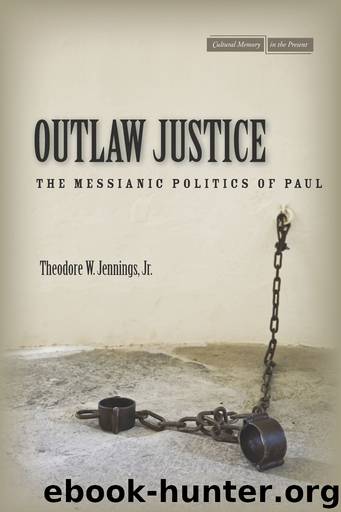Outlaw Justice by Jennings Theodore

Author:Jennings, Theodore
Language: eng
Format: epub
Publisher: Stanford University Press
Published: 2013-04-04T04:00:00+00:00
12 . The Spirit and Life (8:1–17)
We have heard from Paul of the lament of Adamic humanity: the humanity under the dominion of sin that has taken possession of the fleshly vulnerability of the human and taken up residence in the members of this humanity. As a result, even when this humanity yearns for justice and delights in the law that aims at justice, it finds itself nonetheless trapped, subverted, mired in injustice. This humanity, we have seen, was sold out as a weapon of injustice, a slave of injustice, married to injustice.
But what is the other humanity, the messianic humanity, that is delivered from this past servitude? This humanity can scarcely restrain itself from the shout of gratitude for its deliverance: Thanks be to God through Joshua messiah our leader.
There is no condemnation to those in messiah Joshua. Once again we see a sense of solidarity with and belonging or adhering to the messianic, to that which has death behind it, so also law and condemnation.
No condemnation. The law is above all the law of condemnation, which propels the orgai tou theou, the rage of divine justice. And this comes to expression as the force of law, the death penalty that enforces the law. This very penalty has fallen upon the messiah and has been broken upon the body of the executed messianic leader. Somehow the execution of the messiah means that the power of condemnation has been broken. It has lost its power. There can no longer be condemnation for any who are taken up into the messianic event.
How is it clear that the condemnation that fell upon the messiah (from the law both of Israel and of the gentiles, so law always and everywhere) is broken, is made into past tense? By the resurrection, the resurrection by the spirit of holiness, the spirit or power of life that overcomes death and the threat of death that is the very force of law as instrument of death. Thus, we encounter this basic opposition that Paul had signaled at the very beginning of his letter—between flesh and spirit—the flesh as the weakness that overpowers us and the spirit as the force, energy, dunamis that empowers us:
For the law of the spirit of life in messiah Joshua freed you from the law of sin and death.
In both cases, there is a law, but they are quite different laws: the one of life, the other of death; the one that has become the servant of injustice, the other (as we shall hear) that makes us servants of justice. This conflict of law with law is echoed in reflections of Derrida on the claims of hospitality: “The law is above the laws. It is thus illegal, transgressive, outside the law, like a lawless law” (Derrida and Dufourmantelle 79). Paul has elsewhere made use of the idea, in a more compact form, of messianic law (Galatians 6:2; 1 Corinthians 9:21). The phrase and its function may bear echoes of Plato’s suggestion in The
Download
This site does not store any files on its server. We only index and link to content provided by other sites. Please contact the content providers to delete copyright contents if any and email us, we'll remove relevant links or contents immediately.
The Five People You Meet in Heaven by Mitch Albom(3569)
The Secret Power of Speaking God's Word by Joyce Meyer(3220)
Real Sex by Lauren F. Winner(3023)
Name Book, The: Over 10,000 Names--Their Meanings, Origins, and Spiritual Significance by Astoria Dorothy(2987)
The Holy Spirit by Billy Graham(2953)
0041152001443424520 .pdf by Unknown(2846)
How The Mind Works by Steven Pinker(2816)
ESV Study Bible by Crossway(2778)
Ancient Worlds by Michael Scott(2688)
Churchill by Paul Johnson(2587)
The Meaning of the Library by unknow(2572)
The ESV Study Bible by Crossway Bibles(2551)
The Gnostic Gospels by Pagels Elaine(2531)
MOSES THE EGYPTIAN by Jan Assmann(2417)
Jesus by Paul Johnson(2363)
City of Stairs by Robert Jackson Bennett(2354)
The Complete Dead Sea Scrolls in English (7th Edition) (Penguin Classics) by Geza Vermes(2283)
The Nativity by Geza Vermes(2233)
Ancient Near Eastern Thought and the Old Testament by John H. Walton(2226)
